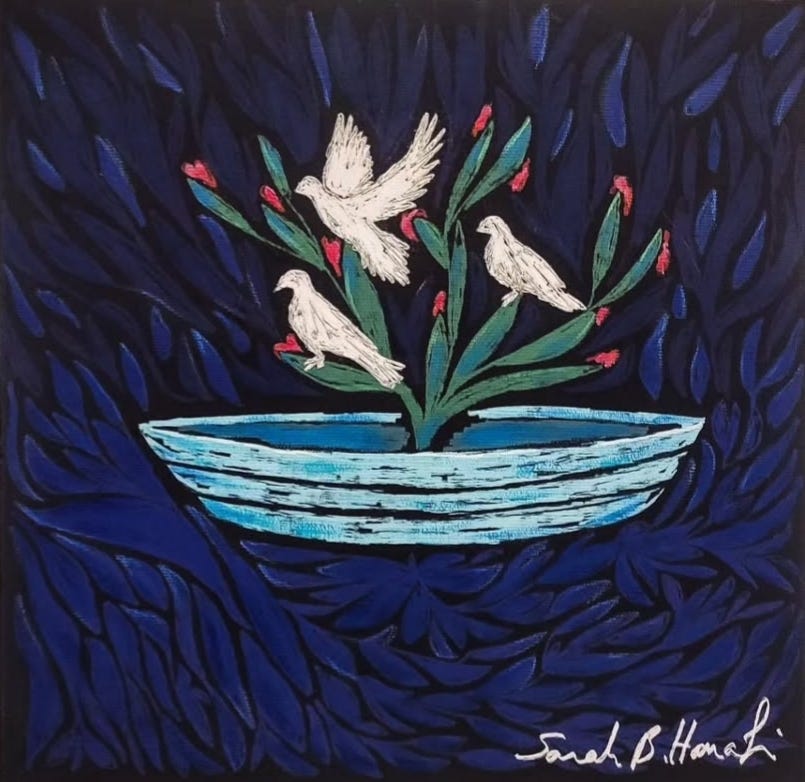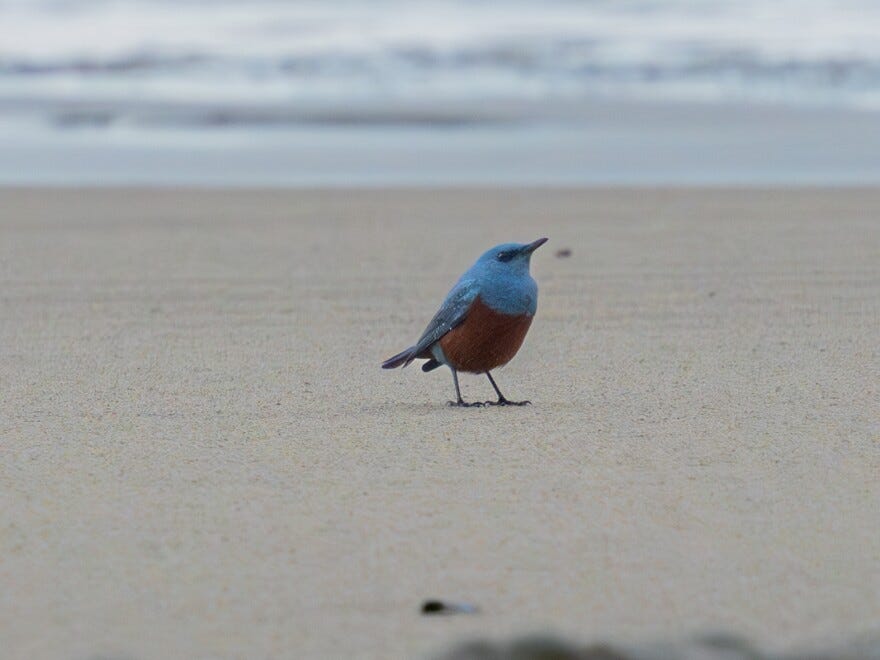Dear Beloved,
In December, a short story I wrote was published in Gypsophila Art and Literary Magazine. “In the Absence of Birds” is a speculative piece responding to the latest issue’s theme, cybernatural - the “cross-section between humanity, technology, and nature.” It takes place in the post-climate crisis future still in recovery, following a collective of people who migrate with the seasons to navigate regular climate disasters. In a high-speed rail car, an elder tells children a story about murmurations - birds in the thousands - and to them, a generation born after the world’s sixth mass extinction, thousands of birds in any one place sounds like a fairy tale.
“In the Absence of Birds” was written with our generation as future elders in mind. Namely, what are we to tell them? How will we - that is, those of us born after 1990 - were promised a certain kind of future and simultaneously robbed of it? What will we, the eventual ancestors, gift future generations with our actions? When our descendants watch archived videos of migrating starlings and geese, when they listen to birdsong on old recordings, what will they think of the legacy we will have left them?
Even after writing “In the Absence of Birds,” a post-climate future doesn’t feel real.
Until it does.
Until it’s seething hot in October and a local orchard’s apples rot before fall. Until the sky is orange from distant wildfires or the smoke clogs up your lungs on your regular walk. Until a hurricane swallows what was once considered a climate haven, far up in the mountains. Until imperialism casts its greedy gaze on Greenland and oligarchs openly talk about annexing northern neighbors.
Until, until, until…until you realize that you don’t see as many birds migrating south as you did when you were a child.
Sandhill cranes gathered in a parking lot in Florida just before Hurricane Milton (2024).
So long as there have been and will be people, we have looked to the skies for our bird relatives. Whether a quetzal feather in a noble’s headdress or a little bird defying borders of apartheid, birds are as intertwined with human culture as strands of braided sweetgrass. More than symbols, birds are messengers.
Ancestors used ornithomancy to predict future events: As early as the 14th century BCE, the New Hittites compiled bird oracles texts. Before colonization, Taiwan’s Indigenous people the Taivoan watched birds to determine hunts’ outcomes. An old English nursery rhyme about counting magpies echoes old ornithomantic traditions.
In 2024, residents in Florida could predict Hurricane Milton’s pending devastation because of sandhill cranes walking through neighborhoods and crowding parking lots. Their calls were like alarms for humans to evacuate.
Just two weeks prior to Hurricane Milton, more than 530 million birds migrated before Hurricane Helene made landfall. Humans must also migrate because of climate catastrophe.
“Birds play a significant role in Indigenous knowledge because they are compelling and familiar figures on the landscape. Their responses to subtle changes in weather and habitat conditions were as apparent to my ancestors as they are to today’s climate or migration scientists.” - Bradford Kasberg (Miami Tribe of Oklahoma), Working to Restore Bird Habitat, I Carry On Traditions That Were Meant to Be Erased

Climate Migration
The climate crisis is caused by an insidious network of fossil fuel companies, enabling government officials, banks, investment firms, and insurance companies. Because of them, we are in crisis. If you have not already, you will have to evacuate your home because of preventable climate catastrophe. Because of oligarchy, you may not even get to go back.
By 2050, there could be as many as 1.5 billion climate migrants. In 2023, there were already an estimated 3 million climate migrants in the United States as residents fled “climate abandonment areas.” Hurricane Helene caused a spike in Buncombe County’s homelessness, and the 2023 Maui fire nearly doubled Hawai’i’s homeless population. Meanwhile, predatory landlords are illegally increasing rent in Los Angeles, and insurance companies canceled home insurance en masse.
All of this becomes all the more insidious after last year’s Supreme Court ruling that permitted states and cities nationwide to criminalize homelessness. This is compounded by the cruelty of the newly reinstalled Trump regime quickly and viciously attacking immigrant communities.
That is why we must rely on each other - to keep ourselves sheltered, to feed one another, and to keep our loved ones safe.
Mutual Aid: DACA Renewals
Superfamilia KC is a trusted undocumented mutual aid group in King County, WA. From distributing clothes to sharing resources, they have created an incredible system of care for immigrant and refugee communities in the Seattle area.
Right now, they urgently seek financial support so they can help community members pay for DACA renewals. The cost of one DACA renewal is $555, and each DACA renewal last for 2 years. Their goal is to raise $1,665 to support at least 3 DACA recipients who need to renew their DACA ASAP.
Help our comunidad reach $1,665 by donating via Venmo to @super_familia with the note DACA.
In the Absence of Birds
Originally published in Gypsophila Art and Literary Magazine, vol. 3, issue 15 - Cybernatural. Edits made for clarity.
When the Earth tilts on its axis and winter’s old promise lingers in the bleeding horizon, ancestral memory thrums in our bones and we know the season has changed. We taste transformation in the pregnant air, heavy with clouds, and know they will soon burst. We gather our elders and children, pack them with our few belongings in the high-speed rail, and do as our ancestors and the birds did.
You twist the radio knob, its antenna shifting like a dowsing rod for kin’s signals. Behind you, an elder tells the children a story. Their voice is quiet against the tumultuous winds and humming thunder. They share the story of their mother and her mothers before her. They speak of murmurations, sweeping aerial movements of thousands.
What is a starling? a little one asks, voice pitched with wonder. He says starling like it’s a magical word.
They were little birds. With feathers of purple and green, so dark they seemed black, the elder explains. They carried messages from the ancestors. Like us, they gathered in large groups when migrating from one home to another. In the thousands.
Thousands? This is incredulous to the children who have seen but a few birds in their lifetime, less than you did when you were their age.
One child bounces in their seat, excited. Can we see them? Can we?
The elders’ face softens with tender grief as the other children join the chorus, asking to see the starlings, even just one, one would be enough.
Of course you can, you speak up to spare the elder another small heartbreak. You pick up your communicator and search murmurations. With a press of a button, lights project a hologram. Thousands of starlings dance in the train car, forming graceful arches. The children delight and reach up their hands as if they could touch them.
But one older child’s face scrunches up, feeling tricked. Tears bead at the corner of their eyes. I want to see a real starling!
One day, you say, enraptured by murmurations and hope. One day you will.
You say this not to spare another heartbreak but because it’s true. One day, when it’s safe, the starlings will return. This promise is sealed with our seed banks, embryos and DNA strands saved in glass tubes and vials. One day, when the world is safer, and more livable, we will bring them back. We will all return.
You and I and the elder will be long gone, but our children will see the starlings again.
For now, we leave together in a murmuration, weaving between broken roads and rewilding forests, chased by hurricanes. It is quiet behind us in the absence of birds.
Seeds for Change
If you are worried about an ICE raid, create an emergency plan for you and your loved ones.
See ICE? Share widely with your community - yell LA MIGRA, Approached by ICE? Say NOTHING.
Listen to the Indigenous Climate Action podcast’s episode “How Do You Cancel a Pipeline?” featuring Melina Laboucan-Massimo (Lubicon Cree) and Dallas Goldtooth (Dakota/Dine).
Read Preparing for the apocalypse the rational way by
Ready to take big action in your small town? This zine is love letter to small town organizers: Small Town Organizing for Anarchists.
Mutual Aid Disaster Relief shares plenty of guides and resources for our communities. Check out these DIY Cleanup guides.
Want to deepen your understanding of the intersections of environmental science, political history, and global affairs? Of course you do. Check out
’s newsletter.
🌱 Miss an issue of seedgiver? Read past newsletters here.
🌱 Loving seedgiver? Share it with your pod.
🌱 Questions? Email aleksanderaleksander@substack.com
🌱 Help me survive late-stage capitalism and create more art. Become a paid subscriber or make a one-time gift here.
🌱 Get updates on my projects and say hi at aleksanderaleksander.com.







